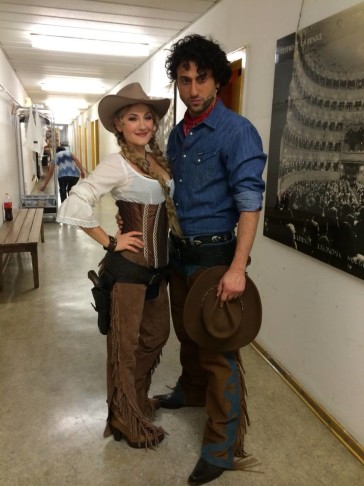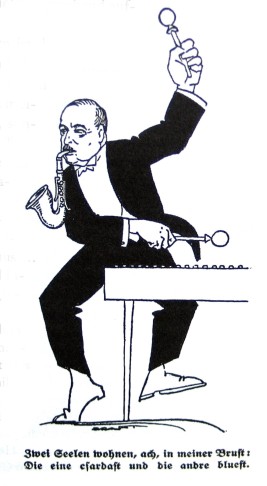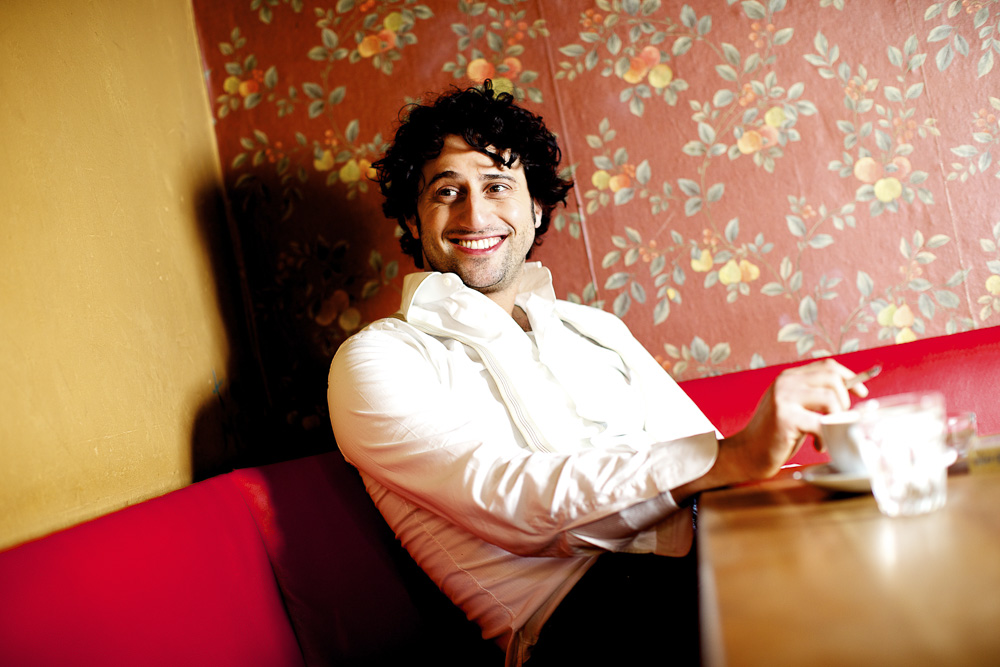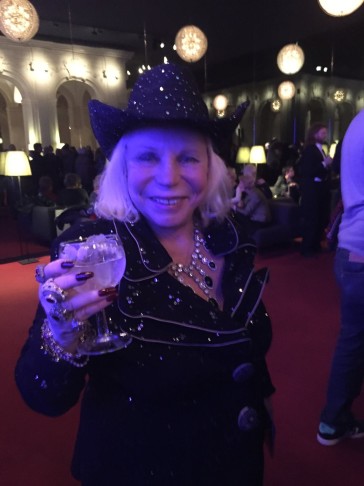Alexandra Ivanoff (With Permission of the Author)
Today’s Zaman
22 December, 2014
Truth be told: the performance of Turkish musical comedy star Serkan Kaya as a swaggering cowboy hero in Kalman’s Arizona Lady at the Komische Oper Berlin must rank as one of the most memorable operetta performances of the decade. Kaya gave a superstar reading of Kalman’s last operetta that was this year’s Christmas special at the Komische. Together with stage partner Katharine Mehrling he re-defined what operetta can sound like – and what it can look like. The popular young actor spoke to Alexandra Ivanoff and the Turkish newspaper Today’s Zaman about his operetta debut. Here is Ivanoff’s article on one of our heroes of 2014.

Serkan Kaya and Katharine Mehrling ready to go onstage in “Arizona Lady” 2014. (Photo: Katharine Mehrling)
The company [Komische Oper] is dedicated to the wide spectrum of opera repertoire, yet Kaya is actually not an opera singer. He is a self-described “pop-rock” vocalist, but his real claim to fame is that he’s one of Germany’s and Austria’s best-known young leading actors (speaking in both Turkish and German) of television, cinema and the live stage.
Kaya is slated to play the charismatic role of Roy Dexter, an American cowboy from Colorado, in the Berlin premiere of Hungarian operetta composer Emmerich Kalman’s (1882-1953) last stage work, Arizona Lady, written just before he died.
What will make this production unique is not only its rarity, but director Barrie Kosky’s choice to mix opera singers and non-operatic types – a genre-bending approach he is fond of using.
Kalman, if he were alive, would be happy with the mix.
A composer who lived in several cities – Budapest, Vienna, Paris, Los Angeles and New York, ultimately settling in the last one – Kalman absorbed and then utilized those varied regional influences to transform operetta.

Caricature of Emmerich Kalman, “jazzing” it up in 1928.
Kalman delighted in injecting America’s Jazz Age jitterbugs of the 1920s and Broadway-show styles of later decades into the more staid European tradition of Viennese operetta, whose only spicy musical element was generally the “czardas” (Hungarian folk dance). His general mashup of international references, despite critics’ sputtering that he was sullying the operetta genre, became his signature style that won hearts all over the globe and eternal fame in his native Hungary.
Kaya, in an exclusive interview with Today’s Zaman in Berlin, spoke about how this role is providing him with a unique opportunity in the middle of a highly successful acting career, and how his Turkish identity in Germany prepared him to face all kinds of challenges.
“My parents came from Erzincan in the 1960s and settled near Köln, in Leverkusen, home to the Bayer pharmaceutical labs. As a result, I have a lifetime supply of aspirin!” he jokes. “I was the third child, but the first to be born in Germany. My parents were ‘Gastarbeiter,’ or guest workers from Turkey.

PR shot of Serkan Kaya (Photo: Radke/Doris Fuhrmann Management)
“As a kid I got involved in school theater projects,” Kaya recounted. “I always had the feeling that acting was something you didn’t have to teach me. At 14, my teacher, who was married to a Turkish woman, decided to leave Germany and live in İstanbul. As his farewell, he wrote a part for me in the school play. Then I auditioned for a theater school in Essen. They offered me two spots – one for singing and another for acting. I was their first test case [for this kind of double major].”
Kaya made his professional debut in 2006 at the Aalto Theatre in Essen, and was later cast in a production of “Elizabeth” at Vienna’s Theater an der Wien, where he played an assassin.
“Harry Kupfer was the intendant [director] there, and he taught me a lot. Now, things are coming full circle because Kupfer went on to the Komische Oper, and Barrie Kosky is now his successor there.”

Poster design for “Hinterm Horizont,” the Udo Lindenberg musical playing in Berlin.
In 2011, Kaya landed the leading role of Udo Lindenberg, the famous German rock singer, in the ongoing theater production Hinterm Horizont (Beyond the Horizon) in Berlin’s Theatre am Potsdamer Platz. Kaya is still performing the role, but on his own terms: His flexible contract allows him to step out for other assignments and then return to the role on a regular basis.
From those pivotal productions, Kaya’s career jumped quickly to leading roles in television.
On Vienna’s ORF channel, he plays a central character in the popular weekly series Die Detektive (The Detectives), as well as a current primetime comedy series on the VOX channel, Einfach Unzertrennlich (Simply Inseparable).
When Kaya, who is not operatically trained, contemplates his debut at Komische Oper among classical divas, his ambition spikes. “I’ve always been pretty good at singing; at least, that’s what I thought — until I heard these opera singers! Wow, I want to be able to hit high notes like they do! [In the vocal rehearsals, I've heard] this ‘legato’ [smooth, uninterrupted phrases] – it is a new thing for me. It’s very interesting to go there. I want to give my very best.”

Yvonne Kalman, daughter of Emmerich, very happy after the smashing “Arizona Lady” performance in Berlin. (Photo: Private)
Aside from exalted singing matters, he’s thinking of extending Kosky’s conceit by interpreting his character with something more hardcore: using the German rapper style. “That might bring some edginess to the table,” he muses. “We’ll see how that works out.”
This thinking is related to what Kaya explained as one of the anomalies in the business: Directors often demand creativity but rarely use it themselves in casting the actors. “Being Turkish is always an issue for me,” he says. “It’s always about ‘type’ [appearance]. Television especially is about type. There, I am usually not the type they’ve preconceived for a role. But in theater it’s more possible. Here, at the Komische, I’m so lucky to have Kosky as my director. It’s so cool to be able to toss in our own ideas. I feel I’ve always been lucky in my life – being at the right time and right place. That has put me in a positive place to enjoy my craft.”
Kaya expressed a desire to push his craft even further – into Turkey. “When I stay with my parents, I watch Turkish soap operas and my mother absolutely loves Muhteşem Yüzyıl [The Magnificent Century],” he says. “I would love to get a role in Turkish television!”
As oddball luck would have it, one of Kaya’s two leading ladies – and the one the title refers to – is actually a female horse. It remains to be seen how Kosky and Kaya will spin that magic. Equine and all, from Budapest to Broadway with a dash of Turkish delight, Arizona Lady promises to be another lucky landing in Kaya’s career.
If you want to read the original version of the article, click here.

Yvonne Kalman dressed for the occasion. Love it!